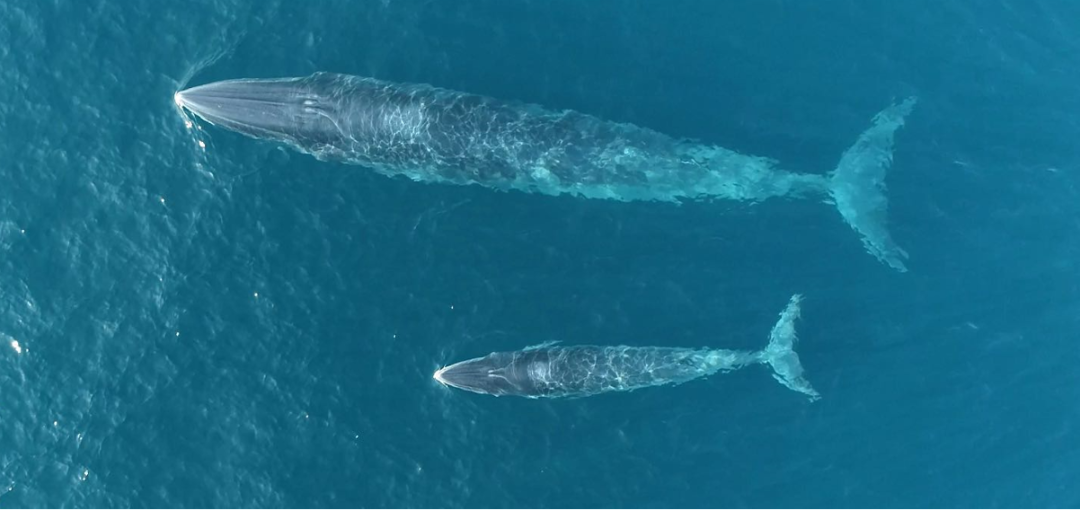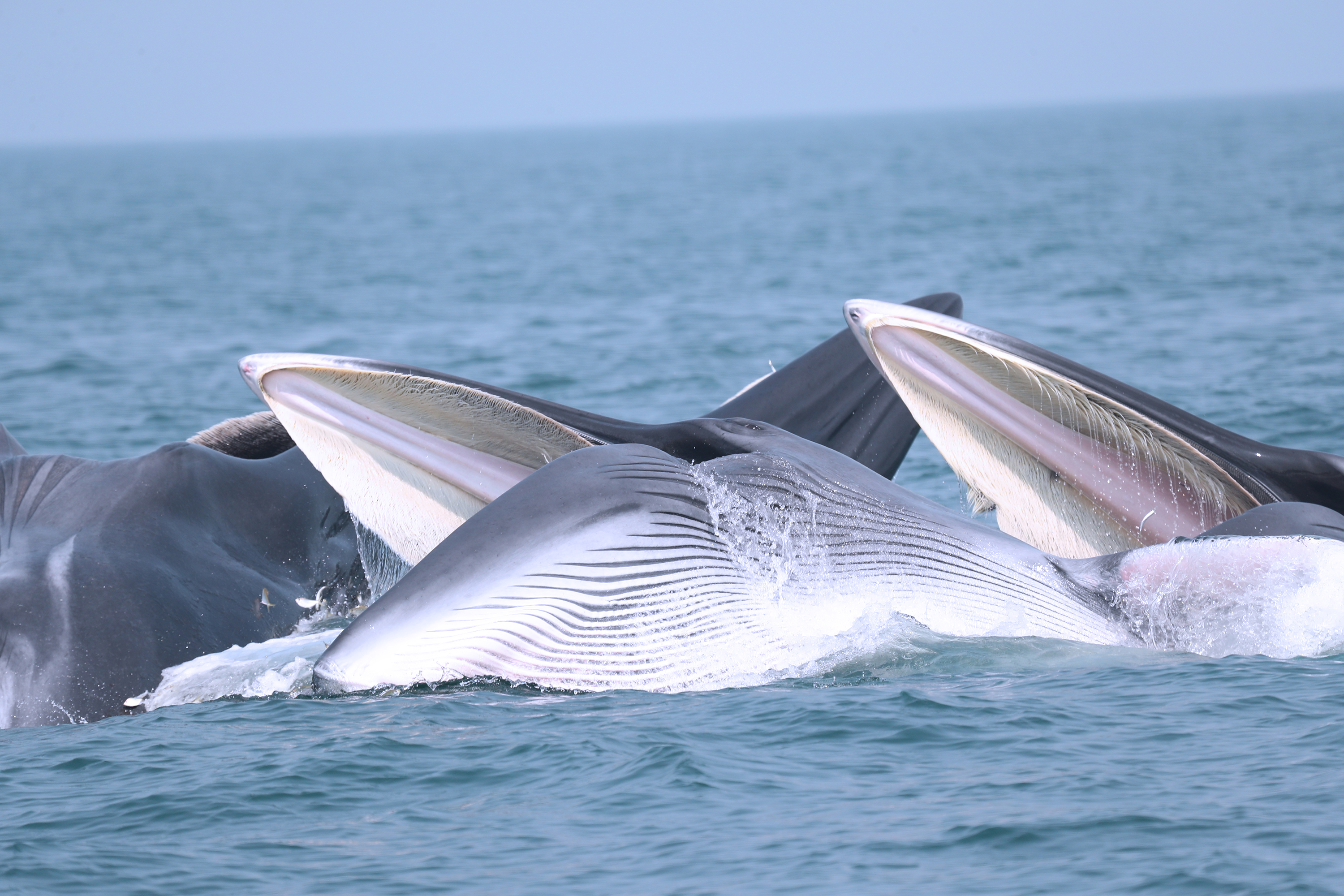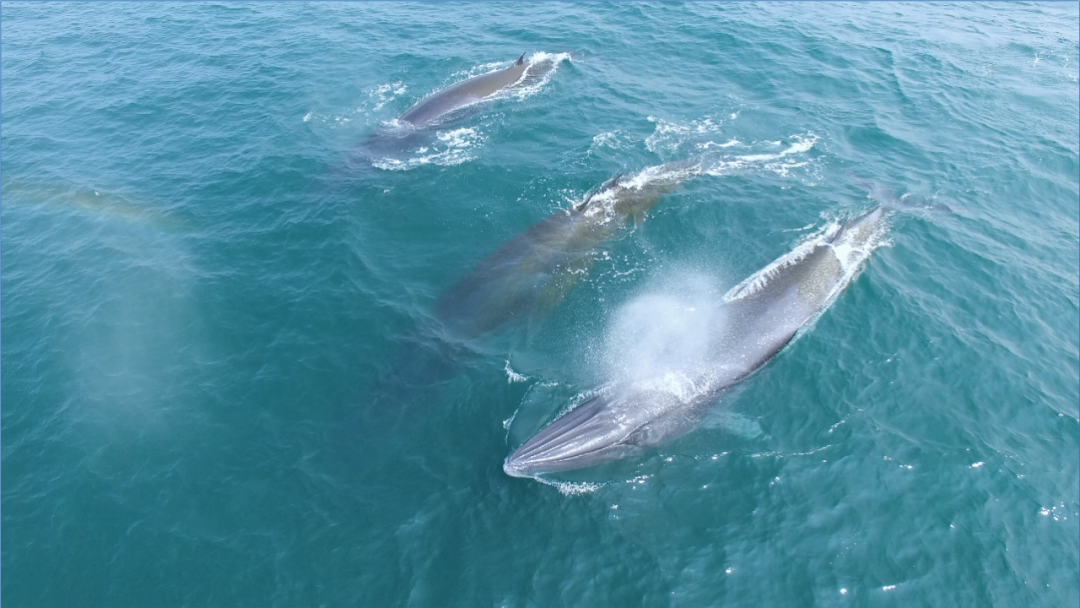It has been six years since Professor Chen Bingyao and his team at Nanjing Normal University started research on Eden's whales in northern Beibu Gulf, south China. From December to April, whenever the waves are low and the weather is fine, they will go to the sea to search for the elusive creature. This is just a typical day for them at sea.
Eden's whale, a subspecies of Bryde's whale, is one of the most poorly understood baleen whale species. They were first spotted off Weizhou Island in south China's Guangxi Zhuang Autonomous Region by some fishermen in 2016. Scientists came and soon recognized the Eden's whale to be the only large whale species that can be stably observed in China's nearshore waters since 1980s.

Professor Chen Bingyao and his team at Nanjing Normal University prepare to go to the sea at the port of Weizhou Island, south China's Guangxi Zhuang Autonomous Region.
Professor Chen Bingyao and his team at Nanjing Normal University prepare to go to the sea at the port of Weizhou Island, south China's Guangxi Zhuang Autonomous Region.
This year, the group of Eden's whales here acted differently.
"In previous years, Eden's whales mostly showed up and foraged near Xieyang Island, a small island southeast of Weizhou Island. This year, they appeared more often close to Weizhou Island. Perhaps for the fish," said Professor Chen.
This change has added difficulties and uncertainties to their survey. It's like visiting your friend's home, only to find that he has gone elsewhere for a feast.
Unlike animal surveys on ground, one can hardly find animal paths or feces to tell whereabouts of whales in the vast sea. What one can rely on is the fishermen's knowledge of fish distribution and a bit of luck.

An Eden's whale with its calf in northern Beibu Gulf.
An Eden's whale with its calf in northern Beibu Gulf.
"They've seen one near the port," said Captain Yang, according to his "secret network" with other fishermen.
"Let's go there then." Professor Chen made the decision.
When they arrived, several whale-watching boats were already there. Not long after that, one Eden's whale came up to the surface to breathe. Professor Chen quickly snapped multiple photos of the whale's dorsal fin above water, which is a crucial indicator of a whale's identity. Chen's team was well prepared and got to work.
"We need to record the GPS coordinate at the sight of the whale, how far it is from the boat and in what direction," said Zhang Heng, a postgraduate at Nanjing Normal University. Jiang Xinyue, also a postgraduate, was using various tools to collect environment data, such as salinity, water temperature and water depth.
It is late April now. The large group of Eden's whales has migrated away, and only a few were reluctant to part with the palatable fish here. One particular whale was seen enjoying its dinner despite the presence of many strangers.

The cooperative lateral lunging feeding of several Eden's whales.
The cooperative lateral lunging feeding of several Eden's whales.
It's interesting that Eden's whales here have extraordinarily diverse feeding behaviors. From lunging to non-lunging, from preying alone to cooperating with others, observing their feeding behaviors is like watching a water acrobatics show. After years' survey, Professor Chen's team identified some feeding behaviors that haven't been recorded before.
"We have found a novel behavior that we call 'pirouette feeding.' The whale rises vertically out of the water amid a swarm of fish, and swings around nearly 180° to scoop up fish. We also identified the first cooperative feeding behavior recorded for a Balaenoptera whale. During the cooperative lateral lunging, two to eight whales swam clockwise around a school of fish and simultaneously performed right lateral lunge feeding. It's an awesome view," said Professor Chen.

Three Eden's whales swam together.
Three Eden's whales swam together.
It is estimated that there are over 70 Eden's whales coming to the northern Beibu Gulf on average each year, and this number is larger than the known population of Eden's whales in waters off Thailand and Japan, according to Chen. His team is now working to discover the whales' migration route and large-scale distribution pattern, which demands more time and funding.
The sun gradually came down and the whale disappeared in the distance. The research team prepared to return to the port and call it a day, but the research on whales would continue as always.

Professor Chen and his team at Nanjing Normal University, and two researchers from First Institute of Oceanography, Ministry of Nature Resources and Institute of Hydrobiology, Chinese Academy of Sciences.
Professor Chen and his team at Nanjing Normal University, and two researchers from First Institute of Oceanography, Ministry of Nature Resources and Institute of Hydrobiology, Chinese Academy of Sciences.
About 'Addicted to nature conservation'
Biodiversity, climate change and environment topics are not new, but more and more people have devoted themselves to nature conservation. Some of them are rangers, guarding the forests and protecting local biodiversity; some of them work on desertification control; generations of them spent their lives changing the desert into a green land; some are scientists and researchers, they use the latest knowledge and methods to guide others for a shared future. From April 29 to May 4, CGTN Nature presents stories of those addicted to nature conservation.
For more:
A Bryde's whale with a good appetite visits S China's Shenzhen
Our Coast: Embark on the journey to understanding mysterious Bryde's whales
Our Coast: Chasing Chinese white dolphins
(All photos provided by Chen Bingyao's research team)
(If you want to contribute and have specific expertise, please contact us at nature@cgtn.com.)